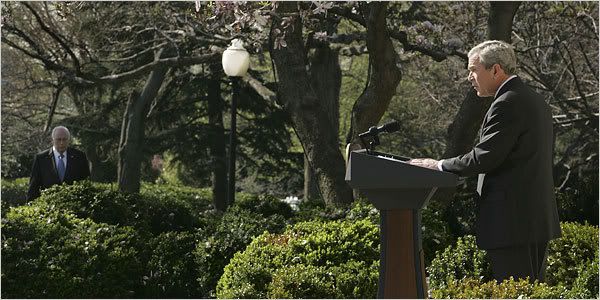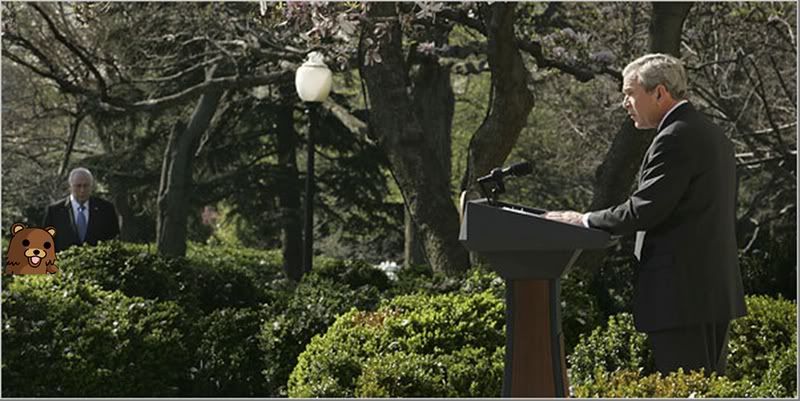From the highly regarded Steve Clemons there is this on the Iranian front:
Joe Klein of TIME magazine backs up the account.
There is a race currently underway between different flanks of the administration to determine the future course of US-Iran policy.
On one flank are the diplomats, and on the other is Vice President Cheney's team and acolytes -- who populate quite a wide swath throughout the American national security bureaucracy.
The Pentagon and the intelligence establishment are providing support to add muscle and nuance to the diplomatic effort led by Condi Rice, her deputy John Negroponte, Under Secretary of State R. Nicholas Burns, and Legal Adviser John Bellinger. The support that Director of National Intelligence Mike McConnell, Secretary of Defense Robert Gates, and CIA Director Michael Hayden are providing Rice's efforts are a complete, 180 degree contrast to the dysfunction that characterized relations between these institutions before the recent reshuffle of top personnel.
However, the Department of Defense and national intelligence sector are also preparing for hot conflict. They believe that they need to in order to convince Iran's various power centers that the military option does exist.
But this is worrisome. The person in the Bush administration who most wants a hot conflict with Iran is Vice President Cheney. The person in Iran who most wants a conflict is Iranian President Mahmoud Ahmadinejad. Iran's Revolutionary Guard Quds Force would be big winners in a conflict as well -- as the political support that both have inside Iran has been flagging.
Multiple sources have reported that a senior aide on Vice President Cheney's national security team has been meeting with policy hands of the American Enterprise Institute, one other think tank, and more than one national security consulting house and explicitly stating that Vice President Cheney does not support President Bush's tack towards Condoleezza Rice's diplomatic efforts and fears that the President is taking diplomacy with Iran too seriously.
This White House official has stated to several Washington insiders that Cheney is planning to deploy an "end run strategy" around the President if he and his team lose the policy argument.
The thinking on Cheney's team is to collude with Israel, nudging Israel at some key moment in the ongoing standoff between Iran's nuclear activities and international frustration over this to mount a small-scale conventional strike against Natanz using cruise missiles (i.e., not ballistic missiles).
This strategy would sidestep controversies over bomber aircraft and overflight rights over other Middle East nations and could be expected to trigger a sufficient Iranian counter-strike against US forces in the Gulf -- which just became significantly larger -- as to compel Bush to forgo the diplomatic track that the administration realists are advocating and engage in another war.
There are many other components of the complex game plan that this Cheney official has been kicking around Washington. The official has offered this commentary to senior staff at AEI and in lunch and dinner gatherings which were to be considered strictly off-the-record, but there can be little doubt that the official actually hopes that hawkish conservatives and neoconservatives share this information and then rally to this point of view. This official is beating the brush and doing what Joshua Muravchik has previously suggested -- which is to help establish the policy and political pathway to bombing Iran.
The zinger of this information is the admission by this Cheney aide that Cheney himself is frustrated with President Bush and believes, much like Richard Perle, that Bush is making a disastrous mistake by aligning himself with the policy course that Condoleezza Rice, Bob Gates, Michael Hayden and McConnell have sculpted.
According to this official, Cheney believes that Bush can not be counted on to make the "right decision" when it comes to dealing with Iran and thus Cheney believes that he must tie the President's hands.
On Tuesday evening, i spoke with a former top national intelligence official in this Bush administration who told me that what I was investigating and planned to report on regarding Cheney and the commentary of his aide was "potentially criminal insubordination" against the President. I don't believe that the White House would take official action against Cheney for this agenda-mongering around Washington -- but I do believe that the White House must either shut Cheney and his team down and give them all garden view offices so that they can spend their days staring out their windows with not much to do or expect some to begin to think that Bush has no control over his Vice President.
It is not that Cheney wants to bomb Iran and Bush doesn't, it is that Cheney is saying that Bush is making a mistake and thus needs to have the choices before him narrowed.
Joe Klein of TIME magazine backs up the account.
I can confirm, through military and intelligence sources, part of Steve Clemons' account of Cheney's crazed bellicosity regarding Iran. In fact, having just received a second-source confirmation of the following story, I was intending to post it today:
Last December, as Rumsfeld was leaving, President Bush met with the Joint Chiefs of Staff in "The Tank," the secure room in the Pentagon where the Joint Chiefs discuss classified matters of national security. Bush asked the Chiefs about the wisdom of a troop "surge" in Iraq. They were unanimously opposed. Then Bush asked about the possibility of a successful attack on Iran's nuclear capability. He was told that the U.S. could launch a devastating air attack on Iran's government and military, wiping out the Iranian air force, the command and control structure and some of the more obvious nuclear facilities. But the Chiefs were--once again--unanimously opposed to taking that course of action.
Why? Because our intelligence inside Iran is very sketchy. There was no way to be sure that we could take out all of Iran's nuclear facilities. Furthermore, the Chiefs warned, the Iranian response in Iraq and, quite possibly, in terrorist attacks on the U.S. could be devastating. Bush apparently took this advice to heart and went to Plan B--a covert destabilization campaign reported earlier this week by ABC News. If Clemons is right, and I'm pretty sure he is, Cheney is still pushing Plan A.




